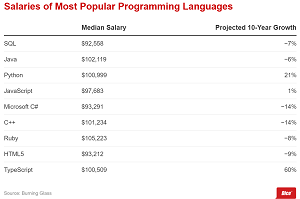News
Report: TypeScript Pays Well, Projected for Huge Growth (C#, Not So Much)
Technical careers specialist Dice dove into job posting data to chart the salaries associated with popular programming languages and projected growth, finding that Microsoft's TypeScript fares well in both accounts.
The job data comes from Burning Glass, which provides real-time job market analytics.
Dice combed through the data to determine which programming languages are most in-demand and how much they pay, because "Those are two vital questions as technologists and developers everywhere decide which skills to learn next."
While Visual Studio Magazine readers may not be looking to take on new skills, they might be interested in seeing how Microsoft-centric languages they probably know and work with -- TypeScript and C# -- stack up, if for no other reason to feel better compared to SQL and HTML5 specialists, the only two languages (among nine) that pay less than C#. Also, its projected 10-year growth is a comparatively dismal -14 percent, tied for dead last.
 [Click on image for larger view.] Top 9 (source: Dice/Burning Glass).
[Click on image for larger view.] Top 9 (source: Dice/Burning Glass).
TypeScript provides a happier story. It pays fairly well (fifth), but really shines in projected 10-year growth, where an astounding predicted rate of 60 percent dwarfs all other languages.
Dice opined more about TypeScript specifically.
"It's worth calling out TypeScript here. Technically, it's a superset of the ultra-popular and well-established JavaScript, which means that whatever you code in it is transpiled to JavaScript. That being said, many programming-language rankings (such as RedMonk) treat it as a full programming language. However you define it, it's clear that the language is on a strong growth trajectory, paired with a solid median salary. If you're looking for a new programming language to learn, keep an eye on it."
Indeed RedMonk just last month announced that TypeScript was firmly ensconced in its top 10.
"TypeScript's ascent up our rankings continues," RedMonk's Stephen O'Grady said. "This is impressive on its own rights; the only language in recent memory to penetrate the Top 10 was Swift, but that was for a single quarter and it quickly bounced back out and has remained relatively static since 2018 in 11th place.
"The initial question facing TypeScript was whether it would be able to hold on. The more appropriate question now is what the language's ultimate ceiling might be. TypeScript moved up for the sixth of its latest eight quarterly rankings, and its popularity is evident when one looks around the industry."
TypeScript also surged in the huge GitHub Octoverse 2020 report.
Another huge study last year, from Stack Overflow, said: "TypeScript's surge in popularity highlights Microsoft's change of direction and embrace of the open source movement. As front end web and Node.JS codebases grow in size and complexity, adopting TypeScript's static typing gives developers increased confidence in their code's correctness.
"TypeScript's ability to be adopted incrementally means developers can dip their toes in, gaining immediate benefits, without having to undertake a risky porting project. As a final sweetener, TypeScript polyfills many ECMAScript changes (like arrow functions, async, and classes) before they're widely available in browsers. We've been persuaded ourselves, as more and more of Stack Overflow's JavaScript is actually transpiled TypeScript."
Dice concluded it was a pretty good story for experts in any of the above languages.
"All of these languages are immensely popular among companies and developer teams; mastering any of them could potentially land you a developer, QA, or project-management job. With languages this ubiquitous, there's not only a need to constantly build new apps and services, but also maintain mountains of legacy code. That translates into significant job security."
About the Author
David Ramel is an editor and writer at Converge 360.